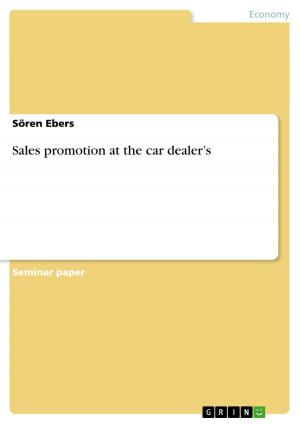| Author: | Jonas Ole Langner | ISBN: | 9783638531030 |
| Publisher: | GRIN Publishing | Publication: | August 7, 2006 |
| Imprint: | GRIN Publishing | Language: | English |
| Author: | Jonas Ole Langner |
| ISBN: | 9783638531030 |
| Publisher: | GRIN Publishing |
| Publication: | August 7, 2006 |
| Imprint: | GRIN Publishing |
| Language: | English |
Seminar paper from the year 2005 in the subject English Language and Literature Studies - Linguistics, grade: 2,3, Martin Luther University (Institut für Anglistik und Amerikanistik), course: Critical Discourse Analysis, 9 entries in the bibliography, language: English, abstract: According to Downing and Locke '[m]odality is the category by which speakers express attitudes towards the event contained in the proposition' (Downing: 1992, 381). So when it comes to analysing political commitments concerning their modal structures, this will be a question of how far the speaker commits himself to the content of his speech. '[M]odality is [also] said to express arelationto reality, whereas an unmodalised declarative treats the processasreality' (Downing: 1992, 382). Especially in the field of politics, that is often regarded as a 'game of lies and intrigues'. It is interesting to find out whether a politician really believes what he says or how he hides his real opinion behind the tools modality gives him. Modality gives us the opportunity to make an utterance sound clear and certain at first glance and it is only revealed at a closer look that the speaker is not as convinced as it seems to be. This term paper can be divided into two parts. The first part of it will be concerned with the theory of modality. As mood is closely linked to modality, it will start with giving a short introduction to this topic. This will also be helpful for the analysis at the end of this paper. Additionally, the topic of this paper is classified to the level of interpersonal meaning, which '[...] is expressed by choices from several different areas of the language which include modality, intonation and [...] 'moods'' (Downing: 1992, 164). This emphasizes the importance of dealing with mood in this paper. For obvious reasons it will not be possible though to analyse the text in the end concerning the speaker's intonation. This chapter will be followed by explaining what modality is all about. The author of this term paper decided to orientate himself according to the division made by Downing and Locke, namely that of extrinsic modality on the one hand and that of instrinsic modality on the other (cf. Downing: 1992, 381-402). Most other concepts of modality by Lock, Quirk, Yule, and others can be adapted to this one, although some of them differ in their terms. [...]
Seminar paper from the year 2005 in the subject English Language and Literature Studies - Linguistics, grade: 2,3, Martin Luther University (Institut für Anglistik und Amerikanistik), course: Critical Discourse Analysis, 9 entries in the bibliography, language: English, abstract: According to Downing and Locke '[m]odality is the category by which speakers express attitudes towards the event contained in the proposition' (Downing: 1992, 381). So when it comes to analysing political commitments concerning their modal structures, this will be a question of how far the speaker commits himself to the content of his speech. '[M]odality is [also] said to express arelationto reality, whereas an unmodalised declarative treats the processasreality' (Downing: 1992, 382). Especially in the field of politics, that is often regarded as a 'game of lies and intrigues'. It is interesting to find out whether a politician really believes what he says or how he hides his real opinion behind the tools modality gives him. Modality gives us the opportunity to make an utterance sound clear and certain at first glance and it is only revealed at a closer look that the speaker is not as convinced as it seems to be. This term paper can be divided into two parts. The first part of it will be concerned with the theory of modality. As mood is closely linked to modality, it will start with giving a short introduction to this topic. This will also be helpful for the analysis at the end of this paper. Additionally, the topic of this paper is classified to the level of interpersonal meaning, which '[...] is expressed by choices from several different areas of the language which include modality, intonation and [...] 'moods'' (Downing: 1992, 164). This emphasizes the importance of dealing with mood in this paper. For obvious reasons it will not be possible though to analyse the text in the end concerning the speaker's intonation. This chapter will be followed by explaining what modality is all about. The author of this term paper decided to orientate himself according to the division made by Downing and Locke, namely that of extrinsic modality on the one hand and that of instrinsic modality on the other (cf. Downing: 1992, 381-402). Most other concepts of modality by Lock, Quirk, Yule, and others can be adapted to this one, although some of them differ in their terms. [...]















